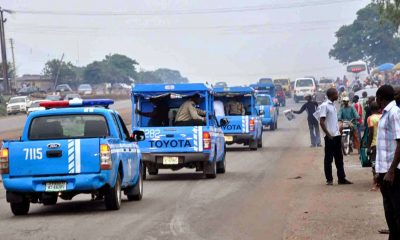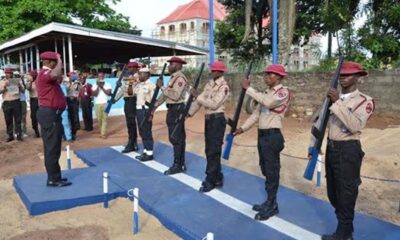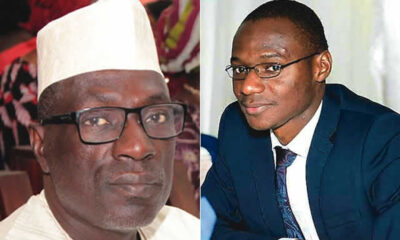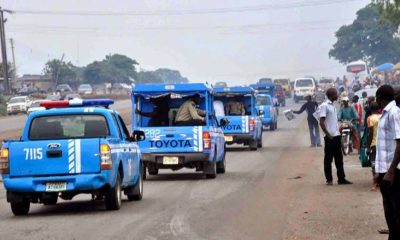Opinion
How FRSC emerged best in FG website performance under new Corps Marshal
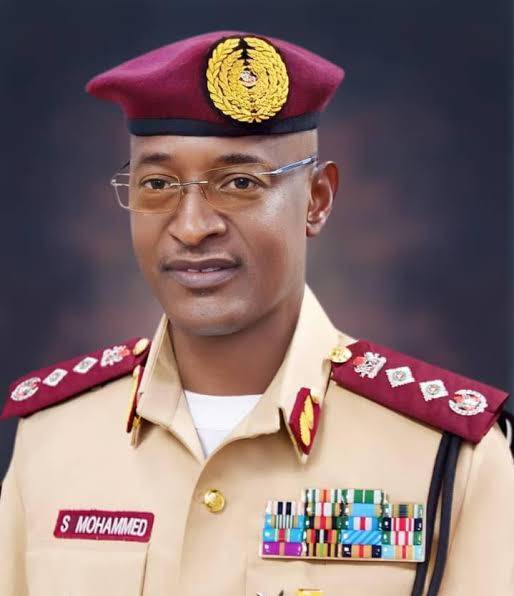
How FRSC emerged best in FG website performance under new Corps Marshal
By Bisi Kazeem
Nigeria is one of the few African countries that have leveraged some road safety principles and recorded remarkable progress in road safety administration and management despite a ‘gloomy’ beginning.
The road safety situation in Nigeria was so deplorable that the World Health Organisation once described the country as ‘worst in the world to travel’ only next to Ethiopia.
That narrative changed through government’s efforts by establishing the Federal Road Safety Commission as the Lead Agency to guarantee safety on every centimetre of Nigeria’s expansive road network of 204,000km. This establishment was done ten years prior to United Nations’ recommendation for all member states to establish agencies directly situated under the central government for ease of unfettered operation.
In its three decades of unbroken services to humanity as a lead agency in traffic and safety management, FRSC has recorded tremendous achievements in the area of Traffic Engineering, Road Safety Administration, Traffic Management and Crash Reduction.
The Corps has now come of age after going through good times and tides. Through the use of state of the art Information Technology facilities, the Corps has been able to enhance its operational capacity aimed at promoting public safety and security. Having been propelled by the imperatives of entrenching ease of doing business as well as aligning with international standards in all fronts, the Corps has successfully designed and operated over 30 web applications for its operational activities so as to create an accessible platform for the general public.
Some of these applications cover the Uniform Licensing Scheme, under which is the One Driver One Record which enables FRSC to track and match records of drivers with their drivers licence, vehicle number plate, traffic offences and others in a single view.
Introduction of the toll free 122 emergency number and a 24 hours call centre established to reduce response time for crash victims; a single step that has reduced emergency response time from 50 minutes to 15 minutes, thereby decreasing the number of fatalities in crash situations. More so, the introduction of Verification Portal for drivers licence and number plates, the introduction of the Road Transport Safety Standardisation Scheme (RTSSS) for uniformity and harmonization of fleet operators in the country, the Driving School Standardisation Scheme (DSSP), the introduction of the speed limiting device whose enforcement began on 1st February, 2017, introduction of vehicle and body-worn cameras to monitor patrol operations, and the vehicle tracking system among others, are policies formulated and implemented to fight road traffic crash in the country to extinction.
The Corps led that foundation for itself, knowing that the road transportation sector in Nigeria accounts for over 90% of passengers and freight movement, and this exerts undue pressure on the FRSC in discharging its cardinal responsibilities.
In view of the growing need to surmount these visible and invisible challenges, the Corps embarked on several reforms which include but not limited to the following: Development of a national road safety strategy road map, improved operational efficiency, enhanced regulatory environment, and accelerated response capability to situations that needed immediate actions.
Added to the aforementioned, the Corps took a step further, defined its path in tandem with UN decade of action as well as the mantra of functional 21st century organization by chatting a path to meet the Accra Declaration of 50% Reduction in Fatality by 2015.
That aside, it went all the way to institute modalities to achieve UN Decade of Action on Road Safety of 50% Fatality Reduction by 2020, and placed Nigerian roads within the league of 20 global safest roads by 2020, as well as UN Decade of Action 2021-2030 which aims at having a society where crashes result in no deaths.
To achieve the stated targets, the Corps developed transformational initiatives focused on People, Processes and Technology (PPT).
That is why today, not only do its staff pride as the most disciplined, but the Corps stands as the best Information Technology-driven organization in Nigeria with its robust data base and over 95 percentage digitalized administrative and operational procedures.
Having given that background, it is noteworthy to look at how the Corps, under the leadership of the present Corps Marshal, Shehu Mohammed, who of course, was amongst members of the group who blazed the trail to set up what is now known as a technology-driven organization, emerged the best amongst over 315 MDAs in website performance and ranking.
It may interest you to know that the 2023-2024 Federal Government Scorecard for ranking Websites of Ministries, Departments and Agencies is an essential benchmark for evaluating the current state of government websites in Nigeria.
The FRSC’s website was selected as the best following a very meticulous, highly diligent and extremely objective review of the Websites of 315 MDAs which were subjected to evaluation for the period under consideration.
The Bureau of Public Service Reforms, a Federal Government agency under the Presidency that organised and issued the award on behalf of President Bola Ahmed Tinubu GCFR justified the relevance of the ranking.
According to them, the effectiveness and functionality of government websites have become a critical component of Nigeria’s public service reform agenda as the nation increasingly adopts digital platforms as the primary means of communication, service delivery and information dissemination. As such, FRSC’s website was found to host a huge collection of information about all products and services of the Corps for the consumption of the general public. This feat placed the Corps ahead of its contemporaries in public service.
That said, to unravel the mystery behind how FRSC made it to the top in information technology and eventually emerged best amongst peers, it is important to look at the direction of leadership and policy focus of the administration of Corps Marshal Shehu Mohammed.
The trajectory of his career as a road safety professional from the day he joined the services of the agency till date is the very factor that has shaped him as an all-rounder in road safety management and administration with a firm and fair handling of goal-oriented affairs as the Corps Marshal.
Upon assumption of office, Shehu Mohammed alongside his team of management, designed and implemented programmes of action, as well as a proactive template to advance the growth of the Corps in all ramifications, with the aim of trending down road crashes and fatality rate.
Being a believer in technology, the Corps Marshal made the digitisation of FRSC operations a cardinal part of his policy thrust. To that end, he took a bold step that was the first of its kind since the establishment of the Corps, by appointing a Technical Adviser who will mount the wheels that would eventually bring FRSC to speed in the deployment of information technology in the work place.
This placement of round pegs in round holes was the catalyst, the propellant force, as well as the icing on the cake that catapulted the Corps to more enviable heights and achievements in digitisation.
Retrospectively, Corps Marshal Shehu Mohammed has been an integral part of the digitalization process and has driven the technology feat of this noble organization for years now, beginning from Corps Marshal Osita Chidoka who started the revolution to the erstwhile Corps Marshal, Dr. Boboye Oyeyemi who sustained the expertise, through to the immediate past Corps Marshal, Dauda Ali Biu who kept the momentum.
To say the least, his experience has seen the Corps measuring to billing as he is already on the glorious path of unravelling the mystery that would finally bring about the overall digitisation of FRSC operations.
Additionally, just as stated in my last piece, part of the major initiatives introduced by Corps Marshal Shehu Mohammed that brought about the needed result for the Corps is the ongoing digital revolution.
The introduction of Electronic Document Management System (paperless) in the workplace would surely make FRSC the first Federal Government agency to go paperless. This initiative, apart from the speed it will bring to the workplace, will also enhance ease of doing business and bring down the cost of governance.
In the same vein, adequate progress is being recorded on the operational front too. Shehu Mohammed has gone a step further by initiating and launching the first FRSC Mobile Application, a one-stop shop for all FRSC products and services, for quality service delivery.
The FRSC Mobile App was introduced to generate and analyse real-time data on operations, Traffic Crashes data management, and road conditions, and provide customers with feedback on the Corps’ products.
The introduction of the National Crash Information Recording System portal (NACRIS) is another ground-breaking robust data collation initiative that will help in policy formulation, planning, and education.
With this portal, Nigerians could easily report cases of crashes from the point of crash. This initiative will boost data legitimacy and change global perception of FRSC crash data reports for good.
The Corps under his purposeful leadership has proved to be right on track to allay the menace of road traffic crashes on Nigerian roads and usher in a season where there would be no crashes; where even if crashes will occur, it would not result in the death of any Nigerian.
Achievements of such would be recorded based on many pillars and strict implementation of his policy thrust fused in the Corporate Strategic goals of the Corps.
To this end, suffice to state that as a performance-driven organization, with clearly set measurable Key Performance Indicators, FRSC is today, the only law enforcement organization in Nigeria certified by the International Standard Organization.
* Bisi Kazeem, a veteran road safety professional and a public relations expert, writes from Lagos, Nigeria.
Opinion
Ademola Lookman showed Davido and Kemi Badenoch that wisdom is not by age – Omokri
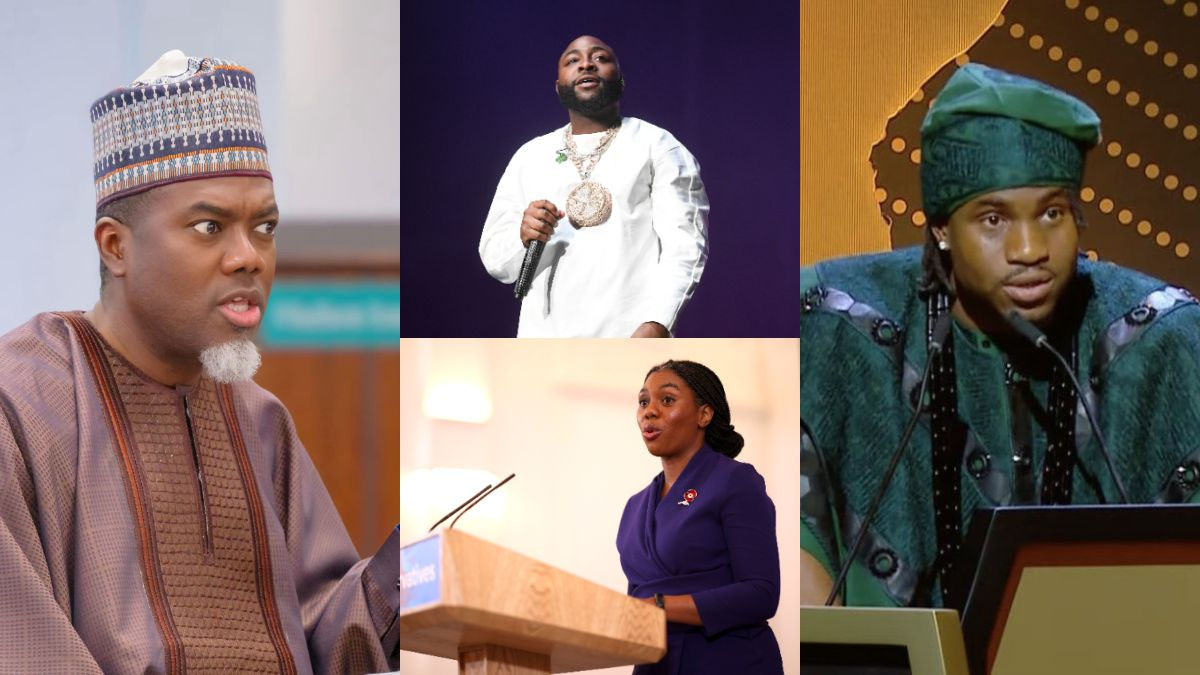
Ademola Lookman showed Davido and Kemi Badenoch that wisdom is not by age – Omokri
Recently, the singer David Adeleke was given a global stage to do whatever he wanted and deliver any message.
Sadly, Mr. Adeleke used the opportunity to speak in an American accent. Not only that, he used that American accent to talk down on Nigeria and tell the world not to invest in Nigeria because, as he put it, Nigeria’s “economy is in shambles”.
Coincidentally, a month after his faux pas, Kemi Badenoch, probably inspired by Davido, used her British accent to talk down Nigeria, calling us “a very poor country” where the police rob citizens.
But the interesting thing about her own case is that the next day, the BBC featured a panel of Conservative Party big shots, and one of them, Albie Amankona, a party chieftain from Chiswick, who is also a celebrity broadcaster, said, and this is a direct quote:
“If you are a Brexiteer, and you are saying we need to be expanding our global trade beyond the European Union, we want to be looking at emerging markets for growth, don’t slag off one of the fastest growing economies in Africa.”
Is it not strange that it took the BBC and a British politician to promote Nigeria as one of the fastest-growing economies in Africa?
And just when we thought it was all bad news, God gave us a breath of fresh air in the youthful Ademola Lookman, who used the global podium granted to him by his winning the 2024 African Footballer of the Year award to promote and project Nigeria and the Lukumi Yoruba language to the world.
READ ALSO:
- MURIC tackles Kemi Badenoch: Can you bring UK police when coming to Nigeria?
- Reps probe $754.2m, N141.6bn tractors, harvesters contract fraud
- Gov Adeleke intervenes in man sentenced to death for stealing fowl (Video)
Wisdom is not by age. If not, Ademola Lookman, who is just twenty-seven, will not have displayed greater wisdom than David Adeleke, who is thirty-two, and Kemi Badenoch, at forty-four.
Mr. Lookman proved that the age of Methuselah has nothing to do with the wisdom of Solomon.
And it is not as though other ethnicities with global icons do not also project Nigeria. They do.
Dr. Mrs. Ngozi Okonjo-Iweala spoke Igbo on the podium of the WTO in Geneva. In terms of prestige, she is FAR above Lookman.
My campaign is not for the Lukumi Yoruba alone. It is for all sub-Saharan Black Africans to learn to speak their language and not use ability to speak English or another colonial language as a measure of intelligence.
Besides Lukumi Yoruba and Hausa, every other Nigerian language, including Fulfulde, is gradually dying out.
General Buhari is half Fulani and half Kanuri. Yet, he cannot speak either Fuifulde or Kanuri. But he speaks Hausa and English.
Fact-check me: In 2012, UNESCO declared Igbo an endangered language.
However, the Lukumi Yoruba are to be commended for their affirmative actions to advance their language and culture.
Let me give you an example. All six Governors of the Southwest bear full Lukumi names: Jide Sanwa-Olu, Seyi Makinde, Dapo Abiodun, Ademola Adeleke, Abiodun Oyebanji, and Orighomisan Aiyedatiwa.
No other zone in Nigeria has all its governors bearing ethnic Nigerian names as first and second names. They either bear Arabic or European names as first names or even first and second names.
If we truly want to be the Giant of Africa, we must take affirmative steps to preserve our language and culture so we can have children like Ademola Lookman.
Teach your language to your children before you teach them English. They will learn English at school. Being multilingual is scientifically proven to boost intelligence.
Fact-check me: In the U.S., Latino kids do not speak English until they start school. They learn Spanish as a first language.
Even if you relocate to the UK, the best you can be is British. You can never be English. And if your choice of Japa is the U.S., the highest you can be is an American citizen. You will never become a White Anglo-Saxon Protestant WASP.
Your power lies in balancing ancient and modern, Western and African, English (or other colonial languages) and your native tongue.
That is the way to reverse language erosion, like the Lukumi Yoruba.
Ademola Lookman showed Davido and Kemi Badenoch that wisdom is not by age – Omokri
Opinion
Kemi Badenoch’s Hate for Nigeria – Femi Fani-Kayode

Kemi Badenoch’s Hate for Nigeria – Femi Fani-Kayode
“I find it interesting that everyone defines me as a Nigerian. I identify less with the country than with my specific ethnic group. I have nothing in common with the people from the north of the country, the Boko Haram, where Islamism is. Being Yoruba is my true identity and I refuse to be lumped with the northern people of Nigeria who were our ethnic enemies, all in the name of being called a Nigerian”- @KemiBadenoch.
Dangerous rhetoric
Kemi Badenoch, MP, the leader of the British Conservative Party and Opposition in the @UKParliament, has refused to stop at just denigrating our country but has gone a step further by seeking to divide us on ethnic lines.
She claims that she never regarded herself as being a Nigerian but rather a Yoruba and that she never identified with the people from the Northern part of our country who she collectively describes as being “Boko Haram Islamists” and “terrorists”.
This is dangerous rhetoric coming from an impudent and ignorant foreign leader who knows nothing about our country, who does not know her place and who insists on stirring up a storm that she cannot contain and that may eventually consume her.
It is rather like saying that she identifies more with the English than she does with the Scots and the Welsh whom she regards as nothing more than homicidal and murderous barbarians that once waged war against her ethnic English compatriots!
All this coming from a young lady of colour that is a political leader in a multi-ethnic, multi-religious and multi-cultural country that lays claim to being the epitome of decency and civilisation! What a strange and inexplicable contradiction this is.
READ ALSO:
- CCT chair removal: Civil groups sue Tinubu, Akpabio, others
- New President-General of Ohanaeze Chukwu to reign for 27 days
- Economy: I derive no pleasure in causing Nigerians pain, says Tinubu
Her intentions are malevolent and insidious and her objective, outside of ridiculing and mocking us, is to divide us and bring us to our knees.
I am constrained to ask, what on earth happened to this creature in her youth and why does she hate Nigeria with such passion?
Did something happen to her when she lived here which she has kept secret?
Kemi Badenoch’s Hate for Nigeria – Femi Fani-Kayode
Opinion
The cockroach called Dele Farotimi (1)

The cockroach called Dele Farotimi (1)
Tunde Odesola
(Published in The PUNCH, on Friday, December 13, 2024)
The official name for cage fight is Mixed Martial Arts. Street fight, known as ‘ìjà ìgboro’ in Yoruba, is the bane of Ibadan people, says the panegyric of Oluyole, the city of brown roofs scattered among seven hills. MMA, I think, is organised street fighting.
But, long before MMA became a global combat sport in 2000, little devils of St Paul Anglican (Primary) School, Idi-Oro, Lagos, and Archbishop Aggey Memorial Secondary School, Mushin, Lagos, engaged in ‘ìjà ìgboro’, the progenitor of Mixed Martial Arts. Retrospectively, I’m guilty of being part of the little devils of both schools.
Because, instead of heeding the ‘blessed are the peacemakers’ injunction in the Holy Scriptures, to ‘inherit the kingdom of God’, what we did as little demons that we were was to add fuel to the embers of hostility smouldering among fellow students.
As soon as you noticed two students in a heated argument, instead of you to sue for peace, the naughty reaction was for you to grab some soil in clenched fists and spread your fists towards the two disputants, daring both pupils to slap one of the outstretched fists: ‘Ení bá lè jà, kó gbon!’
‘Ení bá lè jà, kó gbon!’ was a call to arms. To prove you’re a lionheart ready to fight, you slap the clenched fist open and watch its content pour out to the ground.
So, in a jiffy, you would see friends who were laughing a while ago, engage in a free-for-all instanter. Regrettably, I initiated some of such fights and participated in not a few. You probably can’t grow up in Mushin and be fainthearted.
Taliatu Mudashiru was my friend and classmate in Forms 1 and 2. Occasionally, when I didn’t get dropped off at school by my father, and I had to make it to school on my own, I first trek from our Awoyokun Street residence to Taliatu’s house on Adegboyega Street before both of us would head up to Akinade Ayodeji’s house two blocks away en route to school.
I thought I was stronger than Tali, as we fondly called him, or Pali Tutu (Wet Cardboard) – if the caller was a mischievous classmate – until one day when we disagreed during a break-time chatter involving other classmates.
A peacemaker stepped forward with clenched fists, chanting, ‘K’éyin lè jà, k’émi lé wò’ran, Èsù ta’po si,’ evoking Baba Devil himself. I slapped one of the fists; Tali slapped the other! ‘Ha, Tali ke? I go kill sombodi!’
Toe-to-toe, Tunde rained blows. Tit-for-tat, Tali responded. We upturned desks and seats as the brawl spiralled to the delight of cheering classmates. But it was short-lived as the break-time bell saved the day. We swore at each other but classmates begged us, like peacemakers, to save our punches and wait till after-school hours to throw them.
READ ALSO:
- Gunmen attack Gombe community, kill cleric, set houses ablaze
- CAF awards 2024: Lookman, Nnadozie make final list
- Tinubu’s economic policies causing hunger, poverty – Nigerian gov
After school, excited classmates such as Taliatu Olokodana, Akinade Ayodeji alias Kuruki, Hakeem Adigun alias Slate, Jide Oladimeji alias Agama; Kunle Adeyoju alias Iron Bender, Sunday Pedro Oshokai, Sanmi Okuwobi, Sule Mustapha alias Maito; Olalekan Egungbohun, Kazeem Osuolale alias Oju etc led Tali and me to ‘Ojú Olómo ò to’, an arena so named because no parent or guardian’s eyes ever got to see what happened there.
Only Lukmon Yusuff aka OC, Jide Ajose and Segun Majekodunmi would have separated us if they were around. For his good-naturedness, Jide got the nickname Unreasonable while Segun was called Brother because he belonged to the Deeper Life Church and Yusuff got nicknamed O.C. because of his effectiveness as a football defender.
The ‘Ojú Olómo ò to’ was the playground of a primary school that had closed for the day. Impish classmates sat around the edge of the big field, leaving Tali and I at the centre to unleash the devilry in us.
Tali, bigger and an inch taller, was hoping to use his weight to an advantage, grabbing at me but I knew if he slammed me he would feed me with sand, so I used my fists to keep him off.
We wrestled and boxed and kicked and clawed for God knows how long. There was no referee. There was no timeout. There were only ringside viewers who laughed and cheered every kick and blow and the sight of blood. Tali and I bled all over, spent and gasped for breath.
Then I threw a punch, it caught Tali right in the face, and he first went down in a squat, before flattening out on his back. I should have jumped on him and finished him off, but I was barely breathing. I just left him and I turned away to look for my bag and shoes.
The following day, Tali was looking for me on the assembly ground. He appeared proud of us. He shook hands with me vigorously and we hugged for a long period – like warriors after a pyrrhic victory. He earned my respect, I earned his. Tali probably thought I was a sportsman for not finishing him off when he blanked out, but little did he know that all that was on my mind when he fell was me getting home. I probably would’ve fallen too if the fight had lasted longer.
There are similarities between my fight with Tali and the ongoing fight between one of Nigeria’s heavyweight lawyers, Aare Afe Babalola and human rights activist and lawyer, Mr Dele Farotimi.
I know Nigeria is broken and needs fixing urgently. I know that to fix it, something has to give. I know Nigeria’s coconuts of corruption must be cracked on skulls and the water thereof used as atonement for the nation’s corruption.
READ ALSO:
I see many coconuts. I also see the head of Babalola and that of Farotimi. I see other heads, too. But whose skull(s) would crack open the coconuts?
I see a poisonous cockroach encircled by a brood of chickens. Among the chickens is the breed called Supreme. There’s also a breed called Appeal and another breed called High. There’s yet another breed called SANyeri, a name symbolising the breed’s big gowns. The chickens thrust their heads forward, sharply looking right and left, watching intently, communicating in esoteric language. What shall we do to this irritant?
Yet, the cockroach is adamant in the valley of jeopardy, six legs gangling, two antennas roving; person wey wan don die jam person wey wan kill am.
Tali Vs. Tunde. Today, I can’t even remember what caused the disagreement that snowballed into our fight, but I can never forget the pain of the fight. I had thought I would make light work of Tali but I didn’t see his gallantry coming.
Although I’ve never met Baba Babalola, he comes across as a man of commendable philanthropy and frankness. It’s only frankness that could make him stand by the Labour Party and its presidential candidate, Mr Peter Obi, in the 2023 presidential election when the elite of his tribe was queuing behind Asiwaju Bola Tinubu as ‘Shon of the Shoil’.
In the 2023 presidential election, I was neither BATified nor Atikulated just as I wasn’t Obidient. In some articles during the countdown to the election, I called for an overhaul of the 1999 Constitution before the conduct of the general elections, saying none of the presidential candidates would succeed as president if the Constitution wasn’t amended.
I also said there was no ideological difference among the All Progressives Congress, Peoples Democratic Party and Labour Party. If they were different, Nigeria wouldn’t witness six House of Representatives members of the Labour Party defecting to the APC recently, despite LP’s promise of a new Nigeria. While I predict more defections in the coming days, those already defected include Tochukwu Okere (Imo), Daulyop Fom (Plateau), Donatus Matthew (Kaduna), Bassey Akiba (Cross River), Iyawe Esosa (Edo) and Fom Daniel Chollon (Plateau).
In my recommendations, I called for devolution of powers to the states, resource control, independent candidacy and patriotism by the generality of Nigerians for a new order.
And I’ve not repented from my belief that elected Nigerian politicians loot the treasury according to the amount of money available in it, not because one was more decent than the other or one party was better than the other.
This is why I find the anti-corruption campaign of 56-year-old lawyer and human rights activist, Dele Farotimi, assuring though I’m not going to touch the libel stuff just yet.
Although Farotimi is an LP member, his rhetoric resonates with equity, fairness and justice – cornerstones of democracy.
However, there are concave and convex perspectives on the Babalola-Farotimi issue. In secondary school, Physics was intriguing to me, though I found its abstraction intimidating and perplexing. It was in Physics that I learnt about convex and concave lenses. I was taught in secondary school that both lenses are used for correcting short-sightedness and long-sightedness.
Tali died a long time ago. May his soul rest in peace. Baba Afe Babalola is 11 years older than my father who died last March at 84. May the Lord grant Baba Babalola more years in good health, and may he see the end of this war.
To be continued.
Email: [email protected]
Facebook: @Tunde Odesola
X: @Tunde_Odesola
LinkedIn: @Tunde Odesola
The cockroach called Dele Farotimi (1)
-

 Railway13 hours ago
Railway13 hours agoLagos Rail Mass Transit part of FG free train ride – NRC
-

 metro2 days ago
metro2 days agoCourt stops customs from seizing imported rice in open market
-

 metro3 days ago
metro3 days agoFG transfers electricity market regulatory oversight in Lagos to LASERC
-

 metro2 days ago
metro2 days agoAfe Babalola: Court grants Dele Farotimi bail, barred from media interviews
-

 metro2 days ago
metro2 days agoIbadan stampede: Tinubu orders probe as death toll hits 40
-

 News2 days ago
News2 days agoAdebayo Ogunlesi, 2 other Nigerians make Forbes 50 wealthiest Black Americans list 2024
-

 metro24 hours ago
metro24 hours agoIbadan stampede: Ooni reacts after arrest of ex-wife
-
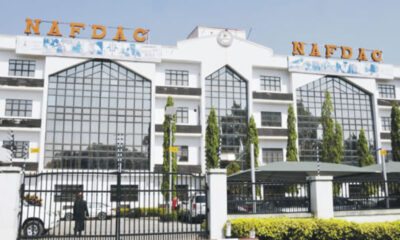
 metro2 days ago
metro2 days agoNAFDAC seizes N5bn fake rice, seals factory in Nasarawa

